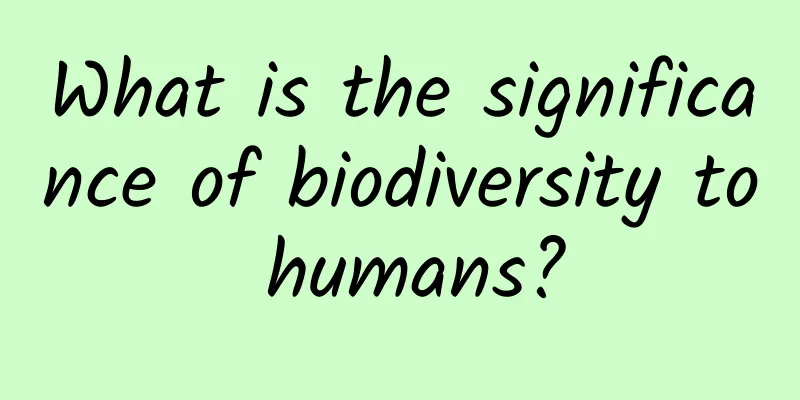What is the significance of biodiversity to humans?

|
Yesterday, the 15th meeting of the Conference of the Parties to the Convention on Biological Diversity was officially held. I was in Kunming, listening to the conference. What really challenges us most about this conference is: How much effort will the fragile human alliance make in protecting biodiversity? How many countries are truly making efforts for the well-being of all mankind? 01. Biodiversity - Humanity saves itself ——————————————— Ultimately, the meaning of biodiversity is that humans save themselves. In nature, humans are not an isolated species, we are part of it. Even from the most utilitarian point of view, humans need diverse creatures. For example, our most basic food - plants We need meat. We also need microbes for fermentation and medicine We also need organisms to provide raw materials Even the fuels we think of as fossil fuels are derived from plants and animals, and today, coal and oil are still being produced in places we can't see. Biodiversity is a natural resource bank, and it is not isolated. For example, in biology there is a term called umbrella species, which means that the habitat of a certain species can cover the habitat of other species. A typical example is the giant panda. Its survival requires the cooperation of a series of biodiversity, and protecting the giant panda can protect many other creatures. 02. Anthropocene: Humans have changed the Earth ————————————— In 2019, the Anthropocene Working Group (AWG) voted to establish a new geological era, the Anthropocene, to reflect the dramatic changes to the Earth caused by human activities. This also marks a major change in our division of geological time[1]. Geological age, what a grand topic. I believe you must be familiar with a series of grand terms such as Cambrian Period, Jurassic Period, etc. Homo sapiens, a species that has only appeared on Earth for 200,000 years, has greatly changed everything on Earth. All of this has made humans the dominant species on Earth. In just a few hundred thousand years, or even just a few thousand years, the human population has expanded from tens of thousands to the current 7 billion. Humans have greatly changed the biological state of the earth. We destroyed the forests, we filled in the lakes, we dammed the rivers, we leveled the mountains… All of this brings us to the sixth mass extinction in biological history: the only known mass extinction caused by a single species. 03. The Sixth Mass Extinction—————————— There have been five major species extinctions on Earth. According to today's research, these extinctions were all caused by major climate or geological disasters. For example, the Cretaceous extinction event that everyone is familiar with is currently believed to be most likely caused by the global climate change caused by an asteroid impact. However, the sixth mass extinction was caused by humans. In 1995, a study titled “The Future of Biodiversity” was published in Science, which pointed out that since the emergence of humans, the rate of biological extinction has increased by 100-1000 times[2]. This is an unprecedented speed. If this speed continues and the endangered animals today become extinct, the overall biological extinction rate will increase 10 times in the future. You know, we have abundant fossil layers to study the average extinction rate of species in the past, which is about 90 species of vertebrates becoming extinct every hundred years. Now, this rate has accelerated. Behind this acceleration is not only the killing of biodiversity itself, but also the destruction of the biological environment by humans. For example, tropical virgin forests have been destroyed on a large scale[3] For example, the global decline in wetlands For example, the depletion of marine fisheries 04. Who will protect our future? ——————————— In fact, Academician Ding Zhongli once mentioned this issue: The earth never needs you to save it. The earth will not be destroyed, but species will be destroyed! The damage to biodiversity ultimately affects humans. However, we are currently not optimistic about the global conservation of biodiversity. For example, the COP15 did not seem to have much online attention, but in fact, this conference was of great significance. In the words of Cui Shuhong, Director of the Department of Natural Ecological Protection: COP15 is the most important conference in the field of ecological environment of the United Nations, and also the most important home diplomatic event of our country this year. China is the host of this event, and we have also seen that China has made a lot of efforts in biodiversity conservation. Over the past 20 years, China has been the world's main force in greening. The country strongly advocates protecting the environment and advocating green waters and green mountains, which is very critical for biodiversity conservation. Another example is that my country has been continuously promoting the construction of nature reserves. Since the construction of the first nature reserve in 1956, China has established nearly 10,000 nature reserves of various levels and types, accounting for about 18% of the country's land area. For example, our country has also made great efforts in protecting seed resources. The park where I am located has the Southwest China Wild Biological Species Resource Bank and the country's important wild plant germplasm resources. Currently, the database has preserved 85,046 copies of 10,601 species of wild plant seeds, accounting for 36% of the number of seed plant species in my country. 2093 kinds of plant in vitro culture materials, 24,100 copies; 7324 kinds of DNA materials, 65,456 copies; 2280 kinds of microbial strains, 22800 copies; and 2203 kinds of animal germplasm resources, 60,262 copies It also has a collection of 900 plant seeds from 22 countries in Europe, America, Asia and Africa. It can be said that China is a very responsible contracting party in biodiversity conservation and is a model country that has been mentioned many times in the Global Biodiversity Outlook. However, the United States, as the world's number one superpower, has not performed as expected. For example, the United Nations Convention on Biological Diversity has 196 parties to date, making it the international environmental convention with the most signatories in the world. However, the United States signed but did not ratify the treaty. It can be said that the binding force of such a convention is a big problem. —————————————— This conference is a summary and planning, but also an appeal. We hope that mankind can unite to address global biodiversity issues, so as to protect the earth and protect mankind! 1 Subramanian, Meera. "Anthropocene now: Influential panel votes to recognize Earth's new epoch." Nature (2019). 2 Pimm, Stuart L., et al. "The future of biodiversity." Science 269.5222 (1995): 347-350. 3 Hirsch, Tim. Global biodiversity outlook 3. UNEP/Earthprint, 2010. |
<<: Is it true that people have no memory before the age of 3? Why is this so?
Recommend
Microsoft shows off its weird Silent Voice technology
Microsoft is working on a new voice input interfa...
Data Report | Is automotive industry promotion ineffective? See how peers invest...
During the period of 2011-2017, the scale of Chin...
Mainstream manufacturers are all competing, and have become seriously homogenized. How should smart cockpits innovate?
Let’s first discuss a question: Do you think the ...
Zhao Dongxuan's "50 Strategies to Make Traffic King"
Course Catalog├──1 . How to detonate customer traf...
How does NetEase Cloud Music differ from those slutty and cheap ones out there?
In the Chinese Internet world, NetEase's prod...
Pessimism and caution spread: small and medium-sized mobile game teams will make their last stand
Nowadays, "recruitment is much better than b...
Metaverse Brand Marketing Guide
NFT is a non-fungible token with the characterist...
Do you think it's cool to open the bottle cap with your teeth? "Open" has "teeth" logic!
Friends gathering, family dinner, late night barb...
How to make it difficult for users to refuse "Inviting users to review"?
The feature of "invite users to review"...
China Association of Automobile Manufacturers: Automobile manufacturing industry's operating income will continue to grow from January to July 2023
According to data from the National Bureau of Sta...
Can silver bracelets cause lead poisoning and make children stupid?
Popularize science and spread science to the publ...
How to do user recall? 10 strategies!
In fact, whether it is recalling users who have a...
How does operations perform data analysis? 3 ideas and 8 methods!
I've been reading "Chief Growth Officer&...
Why is Salmonella the leading culprit in food poisoning?
Recently, many children in a kindergarten in Lian...
Case | I used these 3 bidding strategies and reversed the poor performance situation!
Previously, I worked as a SEMer in a wedding phot...
![Northern Guangdong People's Hospital: O2O closed-loop service for the entire medical process [WeChat Enterprise Account Case]](/upload/images/67ebf29366f64.webp)








